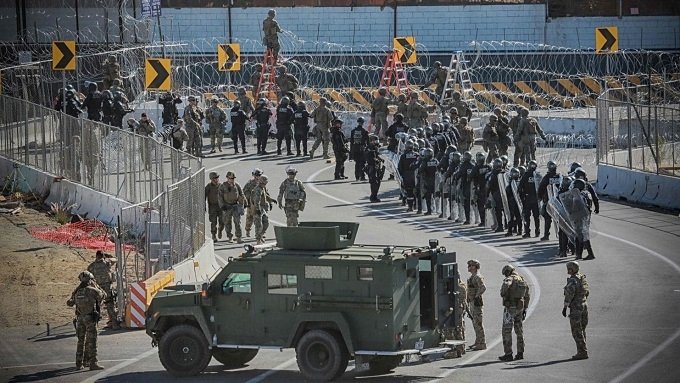


|
|
|
|
According to the US Customs and Border Protection (CBP), since
the morning of November 26, the vehicle and pedestrian crossings at the San
Ysidro border gate have returned to normal. A day before, the US side was
forced to temporarily stop all activities at the busiest border between the
two countries, which deals with roughly 70,000 arrivals of vehicles and
20,000 arrivals of passers, after the Tijuana police dissolved a riot of
migrants from Central American countries who rushed to the Mexican border region
adjacent to the US. The US law enforcement officials were forced to shoot
tear gas to prevent people from trying to breach the security fence to cross
into the US territory.
This is not the first time that the San Ysidro border crossing
has witnessed tensions and violence related to migrants occurring in the
Mexico-US border. The pressure to protect the southern border has been on the
rise for the administration of President Donald Trump since mid-October, as
an influx of thousands of migrants, wishing to live the "American dream”,
departed from the Honduras city of San Pedro Sula for Mexico’s Tijuana city
to seek ways into the US. The majority of the migrant caravan came from
countries in the "northern triangle” of Central America, including El Salvador,
Guatemala, and Honduras, where poverty and violence are forcing many people
to flee their countries and pursue dreams of a new life in the US. According
to Mexican data, approximately 8,000 people have joined the caravan into
Mexico, and are now gathering at the border region adjacent to the US.
The increasing influx of immigrants towards the US border has
driven President Donald Trump to become "restless”. Adhering to tough
measures in the issue of illegal immigrants, President Trump once declared
the caravan of migrants, consisting of hundreds of criminals, as a "state of
national emergency”, thereby resorting to the military to cope with the
situation, despite protests against the plan to deploy troops to the southern
border. In order to put pressure on the "upstream” governments of the migrant
caravan, Washington has cut aid to El Salvador, Guatemala, and Honduras,
requesting that the three Central American countries and Mexico take measures
to prevent the influx of migrants to the US. The currently fractured
relationship between the US and Mexico has become increasingly worse due to
the issue. The US criticised Mexico for not stopping the migrants from
crossing into the US, while the two sides have yet to agree on appropriate
measures to address the situation.
A group of Central American migrants climb the border fence
between Mexico and the United States, near El Chaparral border crossing, in
Tijuana on Sunday. (Photo: Getty)
The latest tension at the San Ysidro border crossing was the
"last straw”, as just days before, President Trump ordered the closure of the
border with Mexico for a short period of time aiming to facilitate the
installation of security fences to prevent illegal immigrants from entering
the US. He also warned of the possibility of completely closing the US’s
southern border from early December if the issue of migrants is not resolved.
Together with tightening security, President Trump also proposed allowing the
military to be "more aggressive” with the migrant caravan currently camping
in Mexico near the US border, which he claimed includes at least 500
dangerous criminals. The White House boss also threatened to "close the
government” if the US Congress fails to meet the December deadline for the
approval of the budget for the building of a border wall with Mexico, a
project that he has been pursuing since the early days he came to power.
In reality, it is a difficult task to solve problems related to
the current "migrant caravan” in such a short period of time. According to
observers, what Washington lacks is a package of master measures, including
an immigration policy that fits the context and ways to ensure border
security and national interests but without violating humanitarian principles
towards migrants and refugees and not denying international cooperation in
such a sensitive issue.
Not only facing international protests, President Donald Trump
has not received domestic support for strong measures against the migrants or
the plans to build a "border wall” with Mexico. Security developments in the
southern US border have shown the deadlock of President Donald Trump’s
administration in finding a way out of the crisis of immigrants from Central
America.
|
Source: NDO